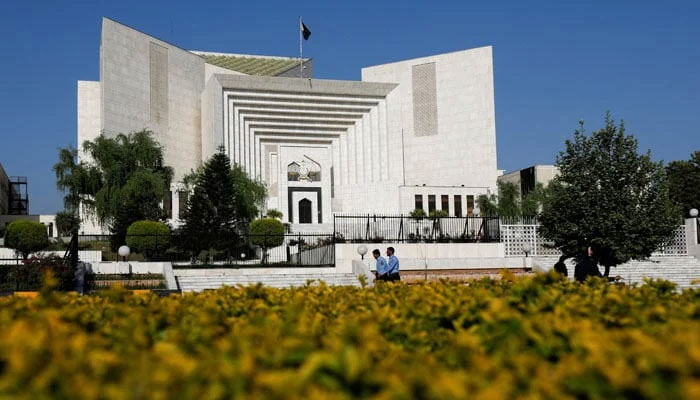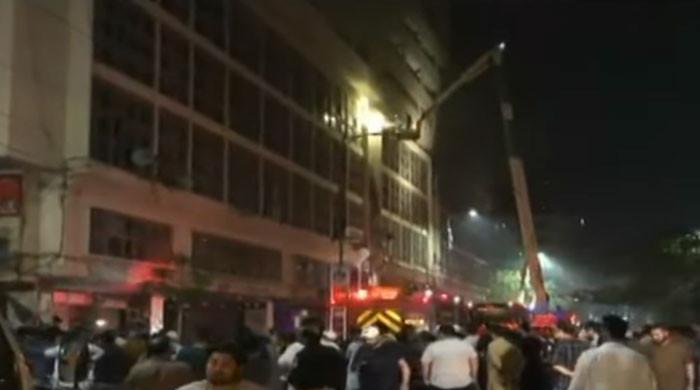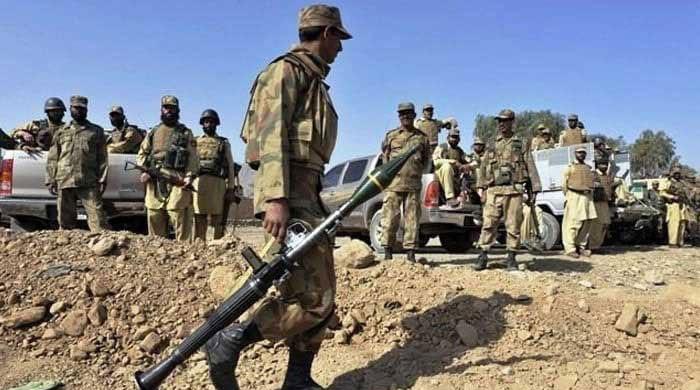SC backs PTI bid for reserved seats in detailed judgment amid NA speaker's concerns
When ECP makes significant mistakes impacting electoral process, judicial intervention becomes necessary, reads 70-page verdict
September 23, 2024

- Constitution doesn't prevent any party from fielding candidates: SC.
- Judgment nullifies ECP's decision to allocate seats to other parties.
- Court surprised how ECP behaved as contesting party itself in case.
ISLAMABAD: The Supreme Court of Pakistan on Monday issued a detailed verdict of the reserved seats case terming the Pakistan Tehreek-e-Insaf (PTI) "a political party" and eligible for the seats' quota.
The 70-page judgment, penned by Justice Mansoor Ali Shah, comes days after National Assembly Speaker Ayaz Sadiq had written to the Election Commission of Pakistan (ECP) saying that the apex court's July 12 short order was "incapable of implementation" after the amendments to Election Act 2017.
The letter referred to the top court's 8-5 majority verdict which had paved the way for the Imran Khan-founded party's resurrection in the assemblies after being kicked out of the February 8 polls.
The NA speaker also pointed out the amendments to Section 66 and Section 104-A, pertaining to the conditions for declaration of a candidate as independent, and the irrevocable nature of the declaration of their joining a political party, respectively.
He further referred to the Section 1(2) of the Amended Election Act regarding the legislation's retrospective effect dating back to 2017.
Elaborating on a party's eligibility to contest the polls, the detailed judgment stresses that the lack of an electoral symbol does not affect its constitutional right to take part in elections.
"The Constitution and the law do not prevent any political party from fielding candidates," the order says while referring to the ECP's decision which had revoked the PTI's "bat" symbol over apparent irregularities in its intra-party polls.
The PTI is a political party and won seats in the national and provincial legislatures in the general elections, the court remarked, while directing the country's top electoral body to notify the former ruling party's members on the reserved seats.
"The ECP's March 1 decision is contradictory to the Constitution and has no legal value," the apex court said while referring to the body's decision wherein it had declined the Sunni Ittehad Council's (SIC) plea for allocation of reserved seats and had instead decided to give them to other political parties on the principle of proportional representation.
Additionally, the court also declared the returning officers' (ROs) act of mentioning PTI candidates as independent candidates in Form-33 "unconstitutional and unlawful".
ECP's failure
Today's detailed judgment also accentuated the electoral body's failure to fulfil its role as a fundamental "guarantor institution" of democratic processes.
"The Commission must therefore fully recognise its constitutional position and the critical role it plays in a democracy while performing its duty to conduct free and fair elections. As a central pillar of democratic electoral processes, the Commission, in its role as a guarantor institution and impartial steward, is tasked with ensuring the transparency and fairness of elections to maintain public trust in the electoral system," reads the order.
Furthermore, Justice Shah's verdict points out that the top court was "surprised" how the ECP behaved as a "primary contesting party against SIC and PTI".
"The function performed by the Commission in the present case was, therefore, quasi-judicial," it said.
"In the present case, the Commission was a proper party to assist the court ineffectually and completely adjudicating upon and settling all the questions involved in the case. It should have acted in this manner, not as a primary contesting party," the court further remarked.
When ECP makes significant mistakes impacting the electoral process, judicial intervention becomes necessary, the court noted.
'Not an ordinary case, court not bound by technicalities'
Addressing the issue of the PTI being a party to the case, the judgment said that although as per the normal procedure of civil cases, an application for impleadment is first decided and the applicant formally made a party to the case, before granting him any relief in the case.
However, the said case, the court added, was not an ordinary one and revolved around democracy and the fundamental right of the people (the electorate) to choose their representatives.
"The procedural formality of first accepting PTI's application and then granting it the relief does not carry much weight where the court's concern is the protection of the right to vote of the people (the electorate) guaranteed under Articles 17(2) and 19 of the Constitution, more than the right of any political party — whether it be SIC or PTI or any other party," said the detailed verdict.
"[...] this court is not handicapped by any technicality or rule of practice or procedure, nor is the exercise of this power by the court dependent on an application by a party," it added.
It is to be noted that the incumbent ruling coalition had reacted strongly to the July short order saying that the PTI wasn't even party to the case but was given relief nevertheless.
The aforesaid bid of the detailed judgment also seemingly addresses arguments raised by Justices Amin-Ud-Din Khan and Naeem Akhtar Afghan in their dissenting note issued in August wherein they had opined that the PTI was neither before the court nor tried to become a party before the ECP.
Referring to the aforesaid judges' dissenting note, the detailed judgment said that their observations did not "behove the judges of the SC" as they had remarked that the July 12 verdict was not in accordance with the Constitution and the majority judges had ignored and disregarded its mandate.
Noting that the majority verdict judges do not have any issues with their colleagues expressing their views and differing on issues, the judgment said that the manner in which the disagreement was expressed "fell short of the courtesy and restraint required of the judges of the superior courts".
"What is more disquieting is that, through the said observations, they appear to have gone beyond the parameters of propriety by warning the 39 plus 41 (80) returned candidates and urging the Commission not to comply with the majority order, which is the decision of a thirteen-member Full Court Bench of this Court. Such observations undermine the integrity of the highest institution of justice in the country and seem to constitute an attempt to obstruct the process of the Court and the administration of justice," reads the verdict penned by Justice Shah.
'PTI — an enlisted political party'
Elaborating on the previously issued short order, the court said today that a political party's failure to comply with the provisions of Section 209 of the Elections Act relating to its intra-party elections, does not de-enlist it as a political entity.
Noting that although the repercussions do in fact provision that a political party is not to be allocated an election symbol, the court, however, said: "It would be completely illogical to assume that a political party, a juristic person, is fully functional yet there are no natural persons who are either de facto or de jure performing its functions and running its affairs."
"An enlisted political party is a juristic person, and like other juristic persons, it acts through natural persons [....] Therefore, after the intra-party elections (which were not later accepted by the Commission), Mr Gohar Ali Khan had assumed at least de facto charge of PTI’s functions and affairs as its Chairman. Consequently, the acts performed by him on behalf of PTI before 13 January 2024 were fully valid and effective," says the verdict.
It is pertinent to mention here that as per the revised party position issued by the NA secretariat, 213 lawmakers on treasury benches including PML-N's 110 MNAs, PPP (69); Muttahida Qaumi Movement-Pakistan (22), Pakistan Muslim League-Quaid (5); Istehkam-e-Pakistan Party (4) and one lawmaker each from Pakistan Muslim League-Zia, Balochistan Awami Party and National Party.
Meanwhile, the opposition benches include 80 SIC members along with eight lawmakers of the JIU-F.
Eight PTI-backed independent MNAs along with one lawmaker each from Pashtunkhwa Milli Awami Party (PkMAP), Balochistan National Party-Mengal and Wahdat-e-Muslimeen are also part of the opposition.
However, the list doesn't include the 15 reserved seats given to the PML-N along with five and three seats given to the PPP and the JIU-F.











